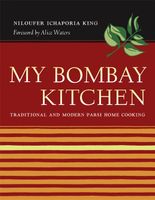🌷 Spring savings – save 25% on ckbk Premium Membership with code SPRING25
Eggs
Published 2007

To give you some idea of the importance of eggs, let’s look at an ordinary day’s meals in a Parsi household like my mother’s. Breakfast usually means eggs. Ever since I can remember, my mother’s breakfast has been a restrained soft-boiled egg. My father liked his eggs fried, with bacon. There are tales of heroic trenchermen in my grandparents’ generation who ate six-egg omelets cooked in lots of ghee. Lunch can mean more eggs in the form of an egg dish — kasa par ida, Eggs on Anything—or eggs can appear in Wedding-Style Fish, or in the coating for some fried thing like potato pattis, or in a curry. If it’s an occasion, there might be a dessert made with eggs—a Bavarian cream, say. Teatime can mean more things with eggs, perhaps a cake or ida pak, a rich Parsi sweet made with dozens of eggs; and then we get around to dinner, which brings us to more visible and invisible eggs, perhaps in the sauce for a gratin like Mother’s Wobbly Cauliflower Custard, or an hors d’oeuvre of “Italian” eggs, or something like île flottante. Our long and lavish wedding dinners feature eggs in two guises, early in the meal on a savory base of onions, and a few courses later as a dense custard, served just before the rice.
Become a Premium Member to access this page
Unlimited, ad-free access to hundreds of the world’s best cookbooks
Over 150,000 recipes with thousands more added every month
Recommended by leading chefs and food writers
Powerful search filters to match your tastes
Create collections and add reviews or private notes to any recipe
Swipe to browse each cookbook from cover-to-cover
Manage your subscription via the My Membership page
In this section
Advertisement
Advertisement


